The 12-week consultation, which opened yesterday, will seek views on a commission proposal for a new system which goes beyond the current Transparency Register, where groups or organisations wishing to influence decision making register their interests and record up-to-date information on them.
However the current Transparency Register is not mandatory and does not cover the European Council.
Commission first vice president Frans Timmermans said: “The commission is changing the way we work by consulting stakeholders more and by being open about who we meet and why.
“We need to go further by establishing a mandatory register covering all three institutions, ensuring full transparency on the lobbyists that seek to influence EU policymaking. An EU that is more transparent and accountable is a union that will deliver better results for citizens.”
The first part of the consultation is calling for input from a broad range of stakeholders, civil society and citizens.
The second part requires more detailed knowledge of the current Transparency Register and will invite opinions on the practical functioning of the current system from those who use it.
There are currently 9,290 registrants on the register, for the most part consisting of in-house lobbyists and trade, business, or professional associations.
The second biggest group on the register is NGOs, followed by professional consultancies, law firms or self-employed consultants and then think-tanks or other research and academic institutions.
Under the Juncker commission’s working methods, as a rule, commissioners should not meet with any organisations that are not listed on the register.
Since November 2014 all meetings between lobbyists and EU commissioners, their cabinets and commissioner director generals must be published within two weeks of taking place.
The commission said the initiative published information on more than 6,000 meetings in its first year, and that the introduction of the system has effectively made entry on the register a mandatory requirement for anyone who wants to meet the most senior EU decision-makers and officials.
However Corporate Europe Observatory, a transparency watchdog, said there are at least 30,000 lobbyists in Brussels, with some commentators estimating they influence at least 75% of all legislation.
A Transparency International report from April 2015 noted that in Brussels and throughout EU member states a notable portion of lobbying efforts occur outside of any formal participatory or consultative channels.
The report gave the three European institutions an overall score of 36% for the quality of their lobbying regulation. While the European Commission scored 53%, the council held back Brussels’ overall score with just 19%.














